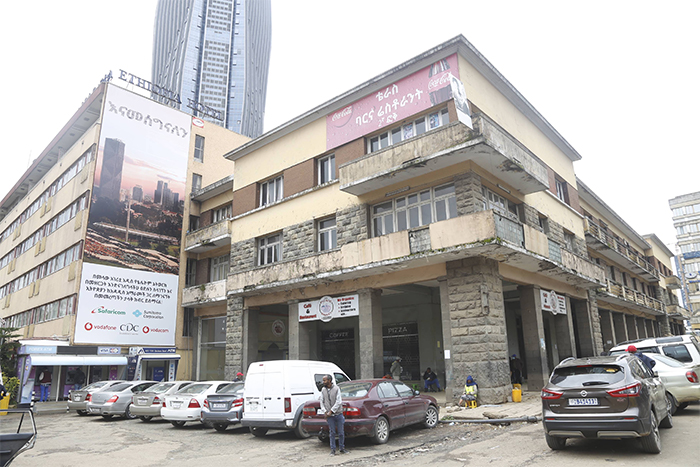
Radar | Nov 09,2019
Last Thursday, a sports bar around the Mekanisa area was packed with goers glued to a 60-inch screen TV. The loud noise of a bar was uncharacteristically absent, but the sudden roars from the crowd were either in reaction to the game played or appealing to change the channel. Morocco played Canada, scoring two goals against one; Belgium and Croatia had a goalless draw.
Yared Solomon, a tall taxi driver, was clutching his betting ticket, seated in the crowd inside Jambo 5 bar. He was to win 2,000 Br with a combination of four matches but paid 300 Br to place the bets. Occasionally, he shrieked at the bartender, “change it to the Morocco game.” One of his bets was riding on Morocco’s win. As the match dragged on, he repeatedly checked out the other match’s result simultaneously; it was not looking good for him.
Yared had only gotten two matches correct when the night’s games ended. Poof! His hopes of winning 2,000 Br went up in smoke, though he was not too distraught.
“You can’t win all of them,” he told Fortune.
The tone in his voice was an echo of reassurance to himself.
The World Cup games ongoing in Qatar have produced a fair share of surprises.
Expected favourites with previous records - Argentina and France, lost to lower-ranked opponents, while Spain, Portugal, Brazil, Germany and Belgium were all eliminated after defeats that astounded their fans. The unpredictable games have stirred the most excitement in Addis Abeba as fans swing thin stacks of papers mistakenly appearing to solve a complex maths problem. Such scenes have become common in the capital’s streets.
However, closer observation would reveal that they merely pick winners on sports betting tickets.
Yared spends close to 1,000 Br a month on Habesha Betting, a pioneer in the domestic betting industry. The World Cup has him spending a little more than usual, but he claims he must win one or two monthly bets to recover his losses. The last time he won a bet was a year ago, 12,000 Br. He perceives his sports betting as a form of entertainment, not a harmful influence on his life.
The sports betting industry is worth about 100 billion dollars globally. The World Cup kicked off on November 20 and has millions watching for entertainment; not few have a vested financial interest in the outcomes, however.
Following a series of directives loosening the legal noose over the past decade, sports betting has shifted into a new gear in Ethiopia.
A local sports bar around Agona packed with people waiting for the Morroco-Portugal game to kick off.
The national Premier League is now called BetKing Ethiopian Premier League for sponsorship reasons after Multichoice Group acquired exclusive broadcasting rights two years ago. While it is “lighthearted” entertainment for most, the jury is out on whether it is a net positive. The betting culture is entrenching with the growth of sports betting companies in number and the resources they are mobilising. Despite official ogle to tighten the regulatory noose and curtail the rapid expansion, psychiatrists warn that the rise in the size of wagerers fuels addiction leading to social ills.
Daniel is a 23-year-old with no regular income. He is a “hustler” doing “anything and everything” to make ends meet. He prefers placing his bets on dog races rather than soccer games.
Most betting houses display bingo raffles and dog racing games, six greyhounds running after an electronically propelled sock, during the day. Daniel bets an average of 1,000 Br daily.
“I was bleeding dry,” said Daniel, referring to his losses during the World Cup.
He meets up with his friends at the betting houses around the Gotera condominium. Betting houses in these areas serve close to 40 people daily with a monthly rent of close to 20,000 Br. The regulars seem to prefer betting on the simple games for as low as 20 Br, with payouts as much as 600 Br. The cashier at Daniel’s usual betting spot sounded sarcastic.
“Many of our regulars are dog racing enthusiasts,” he told Fortune.
Daniel is constantly chasing to recover his previous day’s losses from an array of betting options, starting with picking a winner, guessing ranking placements or combining the two. As with all gambling, the more specific the guess, the higher the potential wins. What Daniel makes as an informal dealer is spent on bets here. He hit the last jackpot two months ago when he won 8,000 Br. However, he conceded that he losses money in the long term.
Not the betting companies, which all need permits from the National Lottery Administration (NLA) to operate. The Administration collects 15pc royalty fees from 55 licensed betting organisations, boosting revenues for the 60-year-old federal enterprise, which netted close to a billion Birr last year. In the first quarter of the current business year, the Administration collected close to 72 million Br in royalty fees, an average of more than a million Birr from each betting company.
According to Tewodros Neway, head of communications, the Administration is serious about imposing penalty fees, provided that the royalty fee is not handed within 15 days. Betting firms are subject to paying double their royalty as a penalty fee and face revocation of licences if they fail to pay in two months. Random inspections by agents from Administration subject them to a one million Br penalty if found letting players under 18 years of age bet.
A law passed a year and a half ago compels betting companies to surrender 20pc of their net income to support sporting clubs, federations, or community organisations. The law also put the license fee to half a million Birr, from 400 Br before. The exponential rise in license fees did little to deter more from entering the business. No less than 15 new companies have joined the fray, hoping to taste a glimpse of this ever-expanding gambling frenzy sweeping the cities.
Golden Betting is one of the companies that went into business this year, run by Abdulkerim Abdulsemed. His company developed an odds-making platform and uniquely markets itself with betting odds different from others. But he was taken aback by escalating running costs. The prohibition of digital payments shocked this new business entrant who claims a market monopoly by the veterans forcing him to move cautiously.
“I wouldn’t advise anyone into the business,” he told Fortune.
Michael Demsew leads the association betting companies have formed to lobby their interests. He saw many of the upcoming betting companies run the risk of going out of business.
“It’s too much of a hassle,” he warns.
Michael sees the sports betting industry as toting compared to neighbouring countries such as Kenya, where 30 companies generate two billion Birr in turnover. It began nine years ago with SportPesa; most betting payments are processed through MPESA, a digital payment service similar to Telebirr.
Following the federal government’s move that banned the digital placement of deposits to these betting companies last month, running costs have shot up. While the World Cup season brought an upsurge in daily customers, physically dragging oneself to the betting houses is inconvenient for generation Z’s such as Henok Yifrashewa, “Emmush” as his friends call him.
Henok is a businessman in his 30s who claims to have found a way of beating the odds. He won 150,000 Br last month on a 130 Br bet on seven matches. While that was his biggest win, Henok has bagged over 50,000 Br on multiple occasions. The peculiar nature of his betting style is exaggerated by the fact that he does not even like soccer. The father of one claims to ignore the favourites in most betting spreads and focuses on the teams’ current status while placing his bets.
Henok has not placed a single bet on the World Cup matches.
“It’s too wild to predict with certainty,” he said.
His friends may see his method and theory as unorthodox, but the results have not disappointed him.
Access to an extensive data set on which odds are based could give companies an advantage over the average person who cannot even compute simple probability distributions, let alone complexities that could upset odds, says Girum Aklilu (PhD), a mathematics lecturer at the Addis Abeba University, who watches football games, occasionally.
As the specifications and conditions necessary for winning increase, the probability drops for the average person. The simple hunch most people feel about their favourite teams would be what they rely on when placing bets, explains Girum. He recalled the year Leicester City won the Premier League in 2016 as one of those rare situations in which betting on mere evaluation of team performance did not pay off.
The sheer complexity of all the possible outcomes in matches or dog races gives the companies an advantage over their customers.
“The house always wins,” said Girum.
Tadios Alemu, 25, has been betting on soccer games for almost three years while studying at Addis Abeba University. Graduating as a Civil Engineer last year, he finds betting more of a side hustle. He has bet on nearly every match this year and hopes that Brazil will win the World Cup.
“It’s easy to win 200 Br betting on one or two games,” he said. “But, it’s not worth it.”
However, Tadios has been lucky neither on his betting spread nor spree, usually missing one or two matches. He believes it is because he bets on too many games simultaneously, hoping to get a big payday.
“It’s only a 100 Br loss at best,” he reasoned. “But it could be in the thousands if I win.”
This seems to be the mentality behind most people who routinely bet on soccer matches. For some, it is not even about winning.
The fantasy of winning six digits of cash helps this regular wagerer in his 40s, who requested anonymity, escape the visceral emptiness of the daily grind. It is not an unusual behavioural response during such times of ordeal.
For Solomon Tefera (PhD), chair of the department of Psychiatry at Addis Abeba University School of Medicine, addicts share most behavioural patterns while certain character indicators mark the gamblers. The addict uniquely lies about the extent of compulsion and is constantly chasing to cover losses. People with a gambling addiction will have withdrawal symptoms and psychological disorders such as grumpiness and restlessness.
A Psychiatrist running the Renascent Mental Health & Rehabilitation Center, Solomon has come across gambling addicts of card games; he still recognises the potential of the betting frenzy to cause addiction. The issue lacks investigation, but gambling addiction shares the same craving-reward-withdrawal cycle as other addictions, with relapse being more common.
The Expert says that treatment for gambling addiction is usually restricted to cognitive behavioural therapy, with only extreme cases of compulsion requiring medication.
Betting alone may not be a cause for great travesty plaguing society. But if people like Yared, Daniel or Tadios find themselves rooting for greyhounds on a mid-weekday - CAUTION!
PUBLISHED ON
Dec 10,2022 [ VOL
23 , NO
1180]

Radar | Nov 09,2019


Fortune News | Mar 02,2019

Fortune News | Nov 04,2023

Fortune News | Jul 18,2021

Fineline | Sep 14,2019

Photo Gallery | Apr 26,2019

My Opinion | Aug 23,2025

Fortune News | Dec 23,2023

Fortune News | May 11,2024

Dec 22 , 2024 . By TIZITA SHEWAFERAW
Charged with transforming colossal state-owned enterprises into modern and competitiv...

Aug 18 , 2024 . By AKSAH ITALO
Although predictable Yonas Zerihun's job in the ride-hailing service is not immune to...

Jul 28 , 2024 . By TIZITA SHEWAFERAW
Unhabitual, perhaps too many, Samuel Gebreyohannes, 38, used to occasionally enjoy a couple of beers at breakfast. However, he recently swit...

Jul 13 , 2024 . By AKSAH ITALO
Investors who rely on tractors, trucks, and field vehicles for commuting, transporting commodities, and f...

Nov 1 , 2025
The National Bank of Ethiopia (NBE) issued a statement two weeks ago that appeared to...

Oct 25 , 2025
The regulatory machinery is on overdrive. In only two years, no fewer than 35 new pro...

Oct 18 , 2025
The political establishment, notably the ruling party and its top brass, has become p...

Oct 11 , 2025
Ladislas Farago, a roving Associated Press (AP) correspondent, arrived in Ethiopia in...